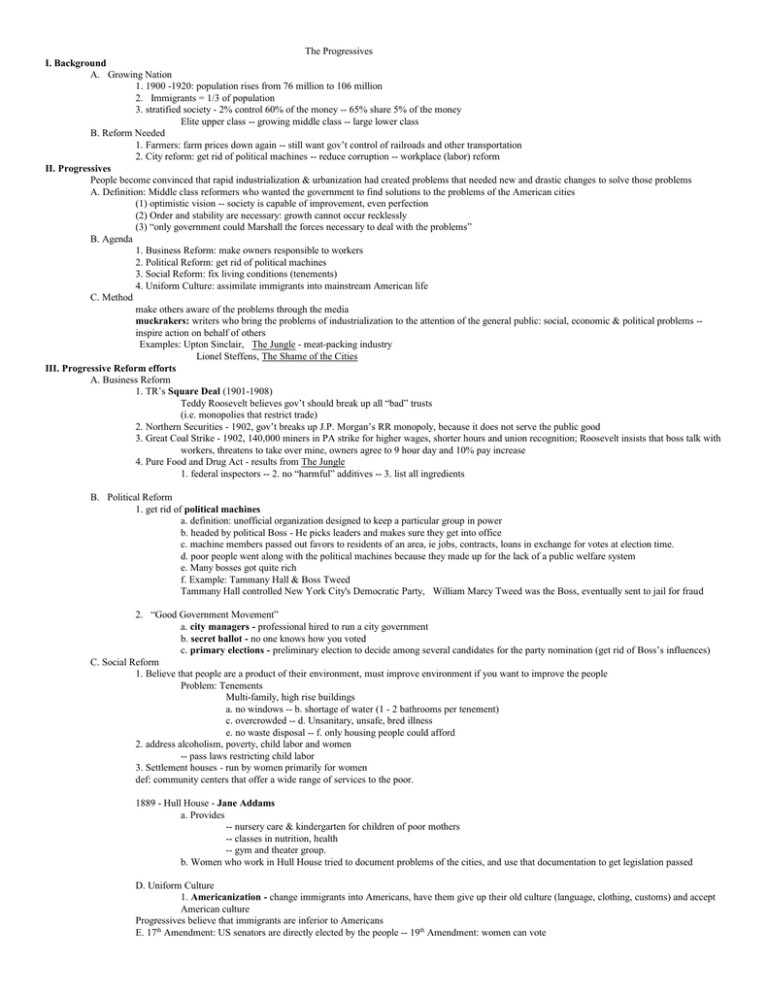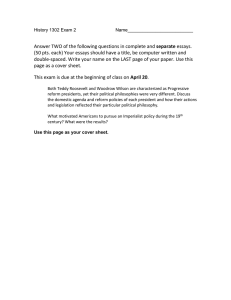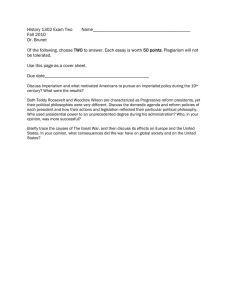I. Background The Progressives A. Growing Nation
advertisement

The Progressives I. Background A. Growing Nation 1. 1900 -1920: population rises from 76 million to 106 million 2. Immigrants = 1/3 of population 3. stratified society - 2% control 60% of the money -- 65% share 5% of the money Elite upper class -- growing middle class -- large lower class B. Reform Needed 1. Farmers: farm prices down again -- still want gov’t control of railroads and other transportation 2. City reform: get rid of political machines -- reduce corruption -- workplace (labor) reform II. Progressives People become convinced that rapid industrialization & urbanization had created problems that needed new and drastic changes to solve those problems A. Definition: Middle class reformers who wanted the government to find solutions to the problems of the American cities (1) optimistic vision -- society is capable of improvement, even perfection (2) Order and stability are necessary: growth cannot occur recklessly (3) “only government could Marshall the forces necessary to deal with the problems” B. Agenda 1. Business Reform: make owners responsible to workers 2. Political Reform: get rid of political machines 3. Social Reform: fix living conditions (tenements) 4. Uniform Culture: assimilate immigrants into mainstream American life C. Method make others aware of the problems through the media muckrakers: writers who bring the problems of industrialization to the attention of the general public: social, economic & political problems -inspire action on behalf of others Examples: Upton Sinclair, The Jungle - meat-packing industry Lionel Steffens, The Shame of the Cities III. Progressive Reform efforts A. Business Reform 1. TR’s Square Deal (1901-1908) Teddy Roosevelt believes gov’t should break up all “bad” trusts (i.e. monopolies that restrict trade) 2. Northern Securities - 1902, gov’t breaks up J.P. Morgan’s RR monopoly, because it does not serve the public good 3. Great Coal Strike - 1902, 140,000 miners in PA strike for higher wages, shorter hours and union recognition; Roosevelt insists that boss talk with workers, threatens to take over mine, owners agree to 9 hour day and 10% pay increase 4. Pure Food and Drug Act - results from The Jungle 1. federal inspectors -- 2. no “harmful” additives -- 3. list all ingredients B. Political Reform 1. get rid of political machines a. definition: unofficial organization designed to keep a particular group in power b. headed by political Boss - He picks leaders and makes sure they get into office c. machine members passed out favors to residents of an area, ie jobs, contracts, loans in exchange for votes at election time. d. poor people went along with the political machines because they made up for the lack of a public welfare system e. Many bosses got quite rich f. Example: Tammany Hall & Boss Tweed Tammany Hall controlled New York City's Democratic Party, William Marcy Tweed was the Boss, eventually sent to jail for fraud 2. “Good Government Movement” a. city managers - professional hired to run a city government b. secret ballot - no one knows how you voted c. primary elections - preliminary election to decide among several candidates for the party nomination (get rid of Boss’s influences) C. Social Reform 1. Believe that people are a product of their environment, must improve environment if you want to improve the people Problem: Tenements Multi-family, high rise buildings a. no windows -- b. shortage of water (1 - 2 bathrooms per tenement) c. overcrowded -- d. Unsanitary, unsafe, bred illness e. no waste disposal -- f. only housing people could afford 2. address alcoholism, poverty, child labor and women -- pass laws restricting child labor 3. Settlement houses - run by women primarily for women def: community centers that offer a wide range of services to the poor. 1889 - Hull House - Jane Addams a. Provides -- nursery care & kindergarten for children of poor mothers -- classes in nutrition, health -- gym and theater group. b. Women who work in Hull House tried to document problems of the cities, and use that documentation to get legislation passed D. Uniform Culture 1. Americanization - change immigrants into Americans, have them give up their old culture (language, clothing, customs) and accept American culture Progressives believe that immigrants are inferior to Americans E. 17th Amendment: US senators are directly elected by the people -- 19th Amendment: women can vote IV. Segregation & Violence A. Problems for African Americans 1. 1890s -economic problems trigger race issues African-Americans rights begin to disappear along with Reconstruction governments a. Voting restrictions to prevent African Americans from voting must own property pay poll tax literacy tests -- must be able to read and write to vote Grandfather clauses: if your grandfather voted in 1867, then you can too purpose: to allow poor whites to vote 2. Segregation - system of legal separation of races, in South a. Jim Crow Laws separated bathrooms, drinking fountains, railroad cars, restaurant, trolleys, etc. b. Plessey v. Ferguson (1896) Supreme Court says "separate but equal" is ok, Always separate, almost never equal c. Violence against AA North - race riots -Chicago (kid on wrong beach) South - lynching, complete with mock trials 200 per year (KKK resurfaces) B. Solutions 1. National Association for the Advancement of Colored People a. founded in 1910 b. multi-racial group c. purpose: fight for African-American civil rights d. first victory: get rid of grandfather clauses 2. Booker T. Washington a. born a slave b. educated at Hampton Normal and Industrial Institute of Virginia (Now Hampton University), a practical education school established by the Freedman’s Bureau at the end of the Civil War c. Established Tuskegee Institute in 1881, in Alabama Teaches Practical Education GW Carver teaches here also d. Believed that equal political rights are impossible and that blacks should focus on economic security (vote with their $$) e. 1895-- Atlanta Compromise, speech -- promises that Blacks are loyal to the Southern way of life, blacks and whites can work together to make money and stay separate in social affairs -- trades political independence for economic security 3. W.E.B. Dubois a. grows up in Mass b. gets Ph.D. from Harvard (1st African American) c. 1896-- teaches Economics and History at Atlanta University d. Believed that blacks should fight for -- 1. right to vote -- 2. equal opportunity e. 1903 - writes “The Souls of Black Folks” 1. attacks Washington for not fighting 2. “color discrimination is barbarism” 4. Nominal Success a. 1900 — 1 in 5 African-Americans owns a home 56% are literate (compare to less than 5% in 1865) b. 1915 — African Americans own 30,000 businesses in the South V. Presidents and their Impact A. Teddy Roosevelt (1900-1908) 1. New Nationalism: Federal government needs to protect people 2. Square Deal B. William Howard Taft (1908 -1912) 1. nine hour workday 2. regulated telephone and radio companies C. Woodrow Wilson (1912 - 1920) 1. New Federalism: government should intervene in economy emphasized state rights 2. Underwood Tariff (1913): lowers tariffs on foreign goods (US is leading economic power, doesn’t need protection from foreign goods) 3. Federal Trade Commission: watches out for unfair business practices to prevent competition 4. Clayton Act: defines unfair business acts a. cannot sit on more than one board of directors b. owner is responsible for any violation of law (can’t shift the blame) Three Progressive Presidents Teddy Roosevelt William Howard Taft Background - Personal and Political Domestic Policy “Square Deal” Hepburn Act Pure Food and Drug Act Foreign Policy Roosevelt Corollary Ballinger-Pinchot Affair Woodro


